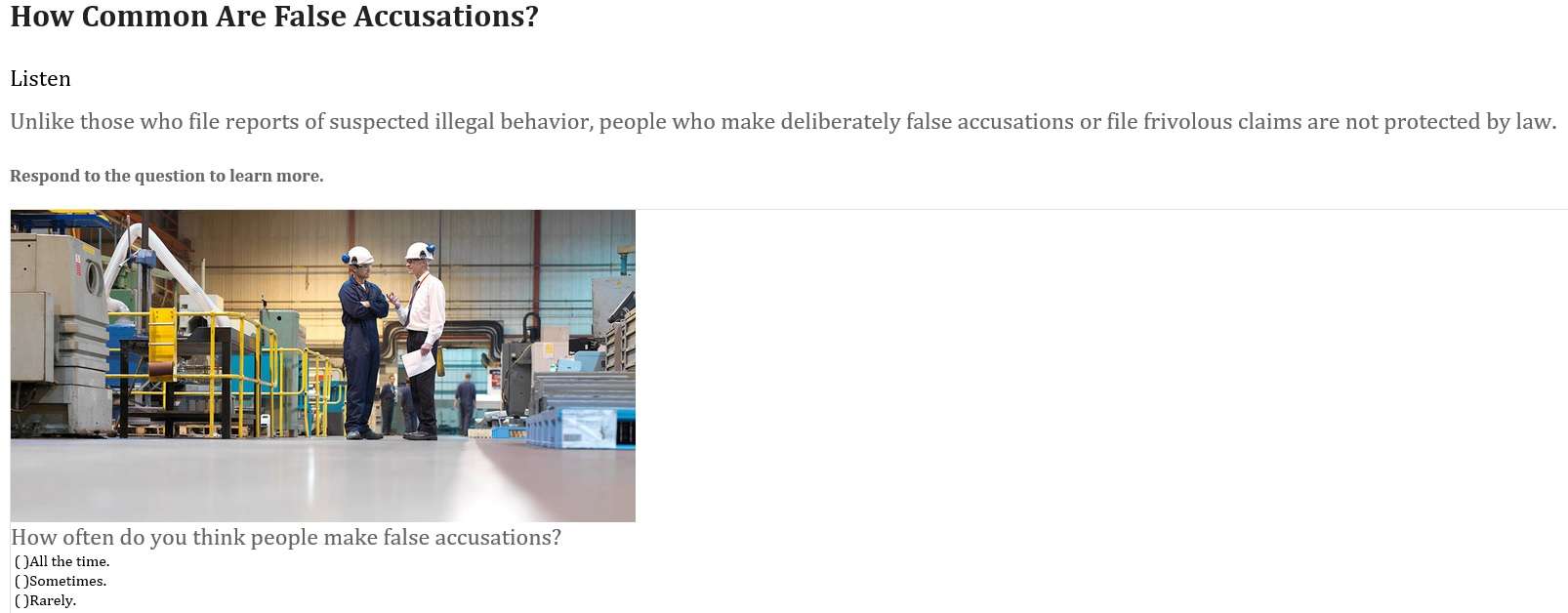The Volokh Conspiracy
Mostly law professors | Sometimes contrarian | Often libertarian | Always independent
"How Often Do You Think People Make False Accusations" Related to Sexual Misconduct, Discrimination, or Retaliation?
"All the times," "sometimes," or "rarely"? A prominent public university's training module requires faculty to give a particular answer.
A correspondent of mine, who is a tenured professor at a prominent public research university, e-mailed me about this item in a mandatory online training that he had to go through:

When he answered "Sometimes," he got the answer, "Not Quite" / "You might be surprised to learn that false reports aren't common, and frivolous claims are almost nonexistent. According to a recent study, it is far more likely that troubling behavior will go unreported than that someone will make a false report. Try again."
He couldn't proceed until he gave the demanded answer, which is "rarely."
Now universities, like other employers, are entitled to require their employees to go through training on various procedures, whether having to do with safety, financial transactions, legal compliance, or managerial obligations. And they are entitled to test the employees to make sure that they are aware of the rules.
But especially in a university, which rightly protects—and indeed demands—intellectual independence and honesty in its faculty, such questions shouldn't require faculty members to give answers that they credibly think are wrong; nor should they turn on vague terms such as "sometimes" or "rarely." (Indeed, the question would be a bad multiple choice question in virtually any context, precisely because "sometimes" and "rarely" are undefined, even in an approximate sense.)
If the university wants to ask, "According to the studies cited in this module, approximately what percentage of accusations are false?," and then require an answer that reflects the studies, I think that would be acceptable. But it's wrong, I think, to require a faculty member to say that he believes some fact, in a situation where the facts are highly contestable (as they are for something hard to measure, such as the percentage of false accusations). And it's doubly wrong to require a faculty member to give one vague answer ("rarely") instead of another ("sometimes").
I take the same view, of course, of exams for students: I think they can legitimately ask a student to report what the material taught in class indicates, but shouldn't test students on what they really believe about controversial matters. That may at times be a vague line (though it can be made clearer with clearly worded questions or statements on the exam material), and at times it might be a hard line for courts to enforce, even in public universities that are bound by First Amendment limits on compelled speech. But it's an important line that universities, whether public universities or private universities that are committed to academic freedom, need to respect.
In this case, the faculty member wrote to the president, provost, dean, Faculty Senate chair, faculty academic freedom committee chair, and the director of the equal opportunity/affirmative action office:
Today I attempted to complete the educational module, Preventing Sexual Misconduct, Discrimination and Retaliation. The most recent email I received on this training states that "This module is a priority for the University and is a required work expectation for all employees. More importantly, completing this module is the right thing to do."
On this last sentence, I disagree. In fact, I cannot in good conscience complete it, nor should any faculty member at this university, since doing so violates academic freedom.
In particular, in order to continue the training, at multiple points I am required to give the one and only "correct" answer to a question. If such questions were only to see if the trainee understood university policy, a legitimate aim of the university, I would have no problem. But they are not limited to this goal. Instead, the training aims to make the user agree to statements about the world in general which the university has no right to require of faculty.
Right now I am stuck in Module 8, Taking Action Against Retaliation, Skills Workshop. Here I am presented with a section entitled "How Common Are False Accusations?". First, the section gives some information
[Here the e-mail includes the image I copied above. -EV]
Then it asks a question:
[Likewise, see the image above. -EV]
If I hit "All the time" or "Sometimes", I receive the reply
[Again, see above. -EV]
More importantly, however, I can't move on. Only by hitting the response "Rarely" can the training continue.
Here, my own sincere answer is "Sometimes" or "I don't know". I understand that the Office of Equal Opportunity and Affirmative Action asserts that the answer is "Rarely", but I am not being tested here on my understanding of what that office asserts. I am being required, as a condition to continue the training, to assent to an assertion to which I do not agree.
I am a tenured faculty member at a public university in the United States, not the Soviet Union. I refuse.
It looks like the university is indeed going to ask the vendor (EverFi) that created the module to revise the structure of its questions; I'll report more if I learn more.



Show Comments (75)